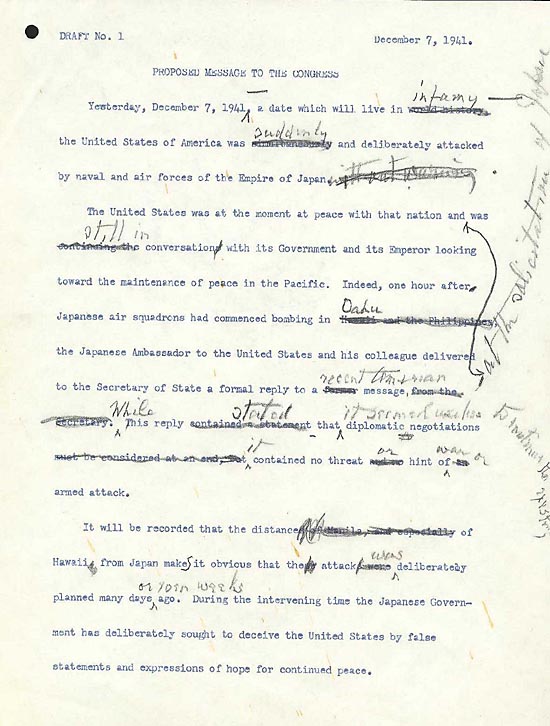
Most interesting is that Roosevelt's famous "a date which will live in infamy" line was originally "a date which will live in world history." Let this be a lesson on word choice. Other changes of note:
"suddenly" attacked instead of "simultaneously" attacked, which changed the focus of the sentence from being attacked by both Japan's navy and air force to the fact that it was a dirty sneak attack. Also, in this same sentence, FDR added "without warning" to the end of the sentence before realizing that "suddenly" essentially said the same thing and he struck it to avoid redundancy.
I also found it interesting how FDR changed "Hawaii and the Philippines" to "Oahu" as the place that was attacked. It's more specific and it removes the Philippines, which, let's face it, Americans wouldn't be nearly as willing to fight for. Later in the speech, other references to the attack on Manila were removed and "attacks" became singular. Indeed, that Japan attacked the Philippines on this date has largely been forgotten by history, thanks largely to Roosevelt's address. "Oahu" delivers a better punch, and it's obvious in the speech that Roosevelt is appealing to Americans' anger in his justification for war.
Later, Roosevelt, well ahead of Strunk and White, substitutes one word ("states") for three ("contained a statement").
Lastly, the beginning of the speech is intentionally written in the passive voice. As the Wikipedia article states
The wording was deliberately passive. Rather than taking the more usual active voice—i.e. "Japan attacked the United States"—Roosevelt chose to put in the foreground the object being acted upon, namely the United States, to emphasize America's status as a victim. The theme of "innocence violated" was further reinforced by Roosevelt's recounting of the ongoing diplomatic negotiations with Japan, which the president characterized as having been pursued cynically and dishonestly by the Japanese government while it was secretly preparing for war against the United States.
5 comments:
Very interesting, Mr. Murphy.
This is so fascinating. Let it be a lesson indeed!
Wow. This really is fascinating. Amazing what difference changing a few key words and phrasing can make. I wonder if history would have been different if he'd stayed with the first draft?
This is one of my favorite posts from you...that's saying something.
This is one of the most interesting blog posts EVER. Thanks!
Post a Comment